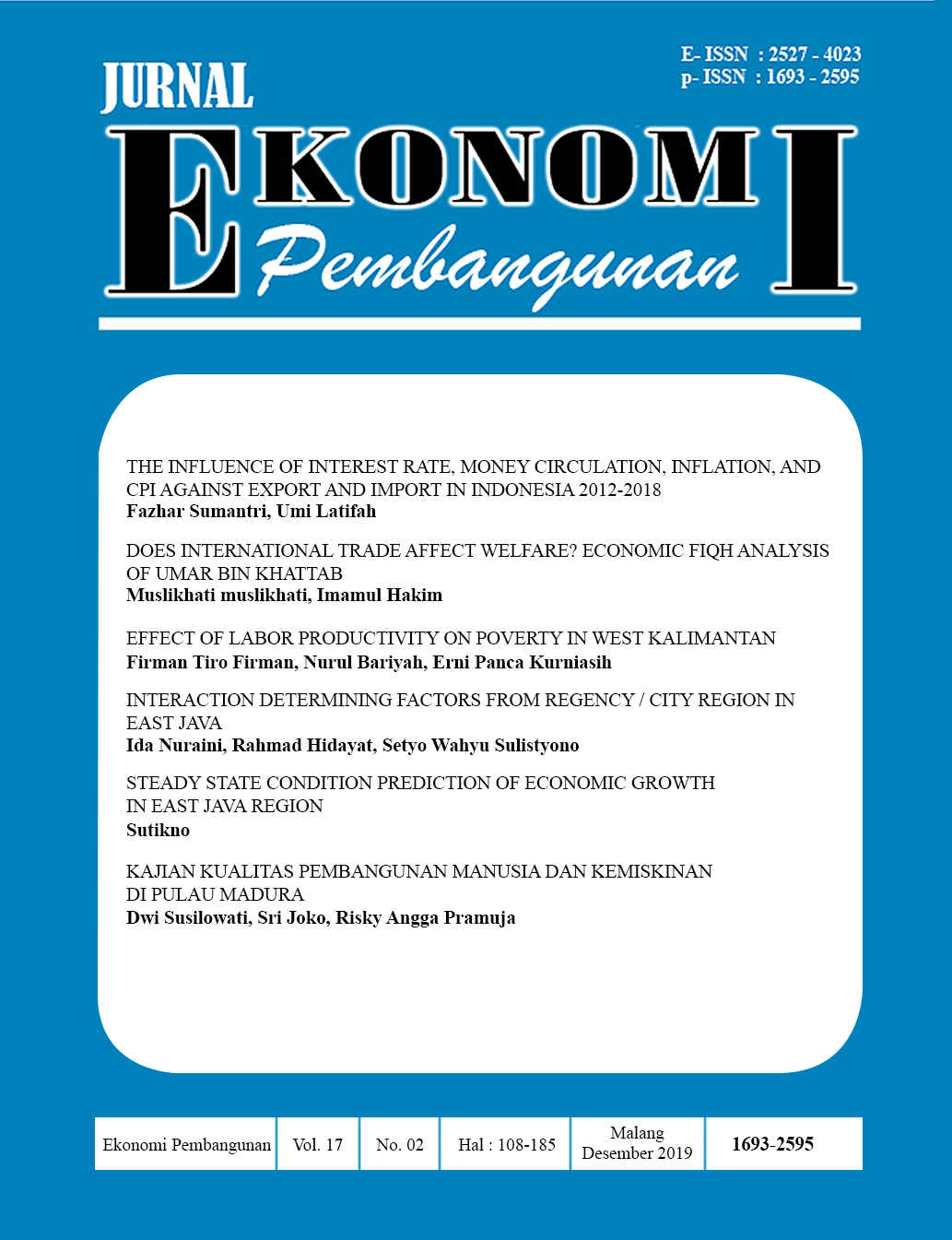DOES INTERNATIONAL TRADE AFFECT WELFARE? ECONOMIC FIQH ANALYSIS OF UMAR BIN KHATTAB
DOI:
https://doi.org/10.22219/jep.v17i2.10732Keywords:
Foreign Direct Investment, Income, International Trade, Net Export, Wealth, Welfare, FiqhAbstract
International trade in the era of globalization is essential. With international trade, the world economy becomes interconnected (Sharing economic) and interdependent. This study aims to find out and analyze how much influence international trade has on improving domestic welfare. The method used in this study is the PLS method, which is a type of multivariate research. International trade as an independent variable and welfare variable as the dependent variable is a construct of the overall model. Trade variables are indicated by FDI and Net export variables, while welfare variables are indicated by variables of income, consumption and wealth. From the results of this research, it was found that the construct variable namely international trade as an independent variable had a significant effect on the dependent variable, welfare. While the indicators for each variable, namely the value of FDI and Net exports, has a significant impact on international trade variables. Likewise with welfare indicators, namely the level of income, consumption and wealth also affect welfare.
Downloads
References
Journal:
Abeliansky, A. L., & Martínez-Zarzoso, I. (2018). the relationship between the chinese “going out” strategy and international trade. E-Journal, 1–18. Retrieved from http://www.economics-ejournal.org/economics/discussionpapers/2018-20
Al-Haritsi, J. bin A. (2003). Fikih Ekonomi Umar bin Al-Khathab (1st ed.; M. Ihsan, ed.). Jakarta Timur: Khalifa (Pustaka Al Kautsar Grup).
Bertoletti, P., Etro, F., & Simonovska, I. (2018). International trade with indirect additivity. American Economic Journal: Microeconomics, 10(2), 1–57. https://doi.org/10.1257/mic.20160382
Cao, J., & Mukherjee, A. (2018). Foreign direct investment, unionised labour markets and welfare. International Review of Economics and Finance, (November 2017), 1–10. https://doi.org/10.1016/j.iref.2018.04.004
Firdaus, D. H. (2013). Analisis Kebijakan Ekonomi Umar Bin Khattab Perspektif Bisnis Islam. At-Tahdzib, 1, 262–278.
Gantman, E. R., & Dabos, M. P. (2016). International trade and factor productivity as determinants of the real effective exchange rate. 2512.
Ilyas, R. (2016). Konsep Uang dalam Perspektif Ekonomi Islam. Bisnis, 4 no 1, 35–57.
Keane, J. B. (2008). contradiction of the welfare state. 37–40.
McCalman, P. (2018). International trade, income distribution and welfare. Journal of International Economics, 110, 1–15. https://doi.org/10.1016/j.jinteco.2017.10.002
Rizqi, M. S. (2016). Servant Leaders: Umar Bin Khattab (13-23 H / 634644 M). Al Turas, XXII, 127–144.
Sabaruddin, S. S. (2014). Dampak Perdagangan Internasional Indonesia Terhadap Kesejahteraan Masyarakat : Aplikasi Structural Path Analysis. Buletin Ekonomi Moneter Dan Perbankan, 17(Nomor 4), 434–456.
Sari, N. (2015). Zakat sebagai Kebijakan Fiskal pada Masa Kekhalifah Umar Bin Khattab. Jurnal Perspektif Ekonomi Darussalam, 1 no. 2, 172–184. Retrieved from ISSN. 2502-6976%09%0A172
Sen, A., Stiglizt, J. E., & Fitoussi, J.-P. (2011). mengukur kesejahteraan. Marjin Kiri.
Siddiqui, K. (2016). International trade,WTO and economic development. Plutojournals.Com/Wrpe/, 7(4).
Sukirno, S. (2010). Teori Ekonomi Makro.
Suliswanto, Mu. S. W. (2016). Tingkat Keterbukaan Ekonomi di Negara ASEAN-5. Ne0-Bis, 10, 33–48.
Waugh, M. E. (2010). International trade and income differences. American Economic Review. https://doi.org/10.1257/aer.100.5.2093
Texbooks:
An-Nabhani, T. (1996). Membangun sistem ekonomi alternatif perspektif islam (kedua; M. Isma’il & A. R. MAsser, eds.). Surabaya: Risalah Gusti.
Dornbush, R., Fischer, S., & Startz, R. (2014). Makroekonomi (8th ed.; Y. Wibisono & R. I. MIrazudin, eds.). Jakarta: PT Media Global Edukasi.
Report
Badan Pusat Statistik,. (2018). Data Ekspor dan Impor. Jakarta: Badan Pusat Statistik (BPS)
Center for Strategic and International Studies,. (2017). Beneficial and Detrimental foreign Cooperation to Indonesia. Jakarta: Centre for Strategic and International studies (CSIS)
Downloads
Published
Issue
Section
License
Authors who publish with Jurnal Ekonomi Pembangunan (JEP) agree to the following terms:
- For all articles published in Jurnal Ekonomi Pembangunan (JEP), copyright is retained by the authors. Authors permit the publisher to announce the work with conditions. When the manuscript is accepted for publication, the authors agree to the publishing right's automatic transfer to the publisher.
- Authors retain copyright and grant the journal right of first publication with the work simultaneously licensed under a Creative Commons Attribution-NonCommercial-ShareAlike 4.0 International License that allows others to share the work with an acknowledgment of the work's authorship and initial publication in this journal.
- Authors can enter into separate, additional contractual arrangements for the non-exclusive distribution of the journal's published version of the work (e.g., post it to an institutional repository or publish it in a book), with an acknowledgment of its initial publication in this journal.
- Authors are permitted and encouraged to post their work online (e.g., in institutional repositories or on their website) before and during the submission process, as it can lead to productive exchanges and earlier and greater citation of published work (See The Effect of Open Access).

This work is licensed under a Creative Commons Attribution-NonCommercial-ShareAlike 4.0 International License.






















